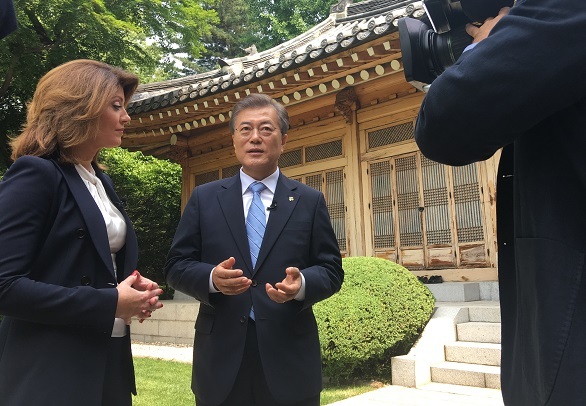South Korean President Moon Jae-in stressed the need to bring North Korea back to the negotiating table while telling the communist North that denuclearization was the "right path" to ensure its safety in a recent interview published Wednesday.
In his interview with The Washington Post, the new South Korean president said his country may also consider reopening its joint industrial complex with the North but only after "some progress" on North Korea's denuclearization.
"For example, the reopening of Kaesong. This is something we can do at a later stage, when North Korea has made some progress on denuclearization," he was quoted in the US newspaper as saying.
But for now, "we must continue to strengthen our sanctions and pressure on North Korea," he said.

President Moon Jae-in holds an interview with CBS at Cheong Wa Dae in Seoul on June 20, 2017. (Photo courtesy of Cheong Wa Dae)
Moon also stressed a need to add dialogue to the available options to deal with the provocative North.
"To resolve the issue we have to add dialogue to the current menu of sanctions and pressure. Every time North Korea commits an additional provocation, the UN Security Council passes another resolution. But when it comes to dialogue, currently there is nothing set," he said, adding he hoped to discuss the issue with US President Donald Trump when they meet later this month in Washington.
The South Korean and US heads of state are scheduled to hold summit talks June 29-30.
In a separate interview with US broadcaster CBS aired Wednesday (Seoul time), the South Korean president insisted the former US administration's "strategic patience" has failed.
"Yes, I believe in the end you cannot deny the fact that strategic patience has failed. So what is urgent right now is to prevent North Korea from making further nuclear and missile provocations by making North Korea freeze its programs. If we achieve that freeze in North Korea's programs, we will be able to sit down and talk with the North Koreans to achieve complete dismantlement, and I hope that President Trump agrees with my view," he said in his interview with CBS.
When asked to evaluate North Korean leader Kim Jong-un, the South Korean president said he is an "unreasonable leader and a very dangerous person" but the person who has "the authority to denuclearize North Korea."
"So we face the task of the complete dismantlement of North Korea's nuclear program while dealing with such a leader," Moon said.
Moon, who came into office May 10, has prompted some concerns in his own country and the United States over their alliance by temporarily suspending the deployment of the THAAD US missile defense system in South Korea for an environmental impact assessment.
The South Korean president said the assessment "does not mean that we will postpone or reverse the decision to deploy."
"The decision to deploy was made by the previous administration. I have made it clear that I will not take the decision lightly."
While speaking to CBS, the South Korean president again stressed that his new administration has made no changes to the decision made by the former administration.
"Well first of all, regarding the THAAD deployment, the radar component and two launchers have already been deployed and are currently operational. And regarding this, the new administration did not make any changes," he said.
Turning to the renewed tension between his country and Japan over the latter's sexual enslavement of South Korean women during World War II, the South Korean leader said the key to resolving the issue was for Japan to take "legal responsibility for its actions and to make an official apology," according to The Washington Post report.
South Korea and Japan reached an agreement in late 2015, which Tokyo claims is designed to do just that.
Repeating his earlier remarks, the new South Korean president said the agreement is not accepted by Koreans, "particularly by the victims."
He still expressed hope to improve his country's ties with Japan, saying they "should not block the advancement of Korea-Japan bilateral relations just because of this one issue." (Yonhap)






![[Graphic News] More Koreans say they plan long-distance trips this year](http://res.heraldm.com/phpwas/restmb_idxmake.php?idx=645&simg=/content/image/2024/04/17/20240417050828_0.gif&u=)